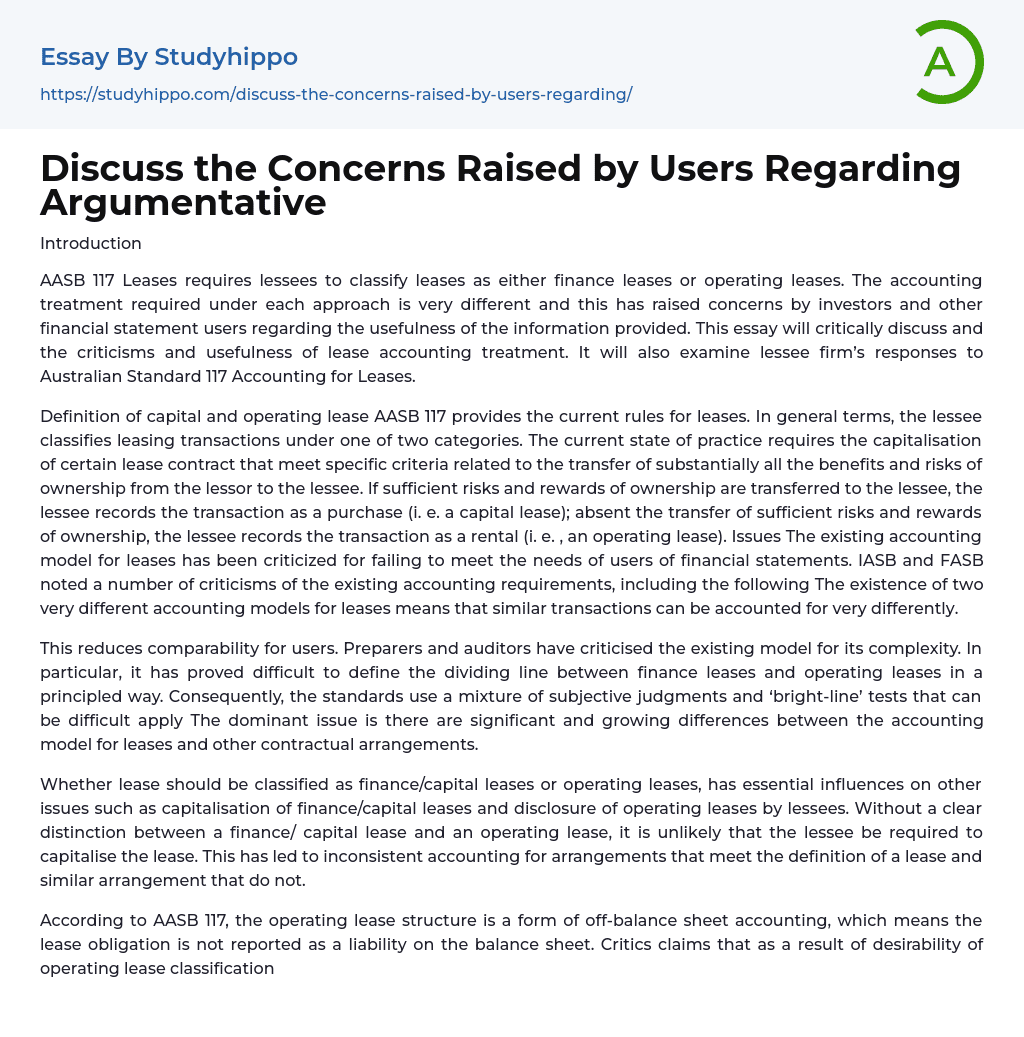

Discuss the Concerns Raised by Users Regarding Argumentative Essay Example
Introduction
AASB 117 Leases mandates lessees to categorize leases as either finance leases or operating leases. The accounting treatment differs significantly under each approach, leading to concerns from investors and other users of financial statements about the usefulness of the provided information. This essay will systematically evaluate the criticisms and usefulness of lease accounting treatment.
The text will evaluate how lessee firms respond to Australian Standard 117 Accounting for Leases, which defines capital and operating leases. AASB 117 establishes the current guidelines for leases. Generally, lessees classify leasing transactions into two categories. Currently, the prevailing practice is to capitalize lease contracts that meet certain criteria regarding the transfer of most ownership benefits and risks from the lessor to the lessee.
If the lessee transfers sufficient risks and rewards of ownership, they will record the t
...ransaction as a purchase (i.e. a capital lease). If there is no transfer of sufficient risks and rewards of ownership, the lessee will record the transaction as a rental (i.e.
There are issues with the existing accounting model for leases, specifically an operating lease. The current model has been criticized for not meeting the needs of users of financial statements. The International Accounting Standards Board (IASB) and the Financial Accounting Standards Board (FASB) have acknowledged various criticisms of the existing accounting requirements. One major criticism is the presence of two distinct accounting models for leases, which can result in significantly different accounting treatments for similar transactions. This lack of uniformity reduces comparability for users of financial statements.
Preparers and auditors have criticized the existing model for its complexity, specifically the challenge of defining the line between finance leases and operating leases in
a principled manner. Consequently, the standards rely on both subjective judgments and 'bright-line' tests, which can be difficult to apply. The primary issue is the significant and growing disparity between the accounting model for leases and other contractual arrangements. The classification of a lease as either finance/capital or operating has important ramifications on related topics such as capitalization of finance/capital leases and disclosure of operating leases by lessees. Without a clear distinction between these lease types, it is unlikely that the lessee would be required to capitalize the lease. As a result, there is inconsistent accounting for leases that meet the definition and similar arrangements that do not.
According to AASB 117, the operating lease structure is considered off-balance sheet accounting. This means that the lease obligation does not need to be reported as a liability on the balance sheet. However, critics argue that this classification is often desired and leads to leases being structured in a way that narrowly avoids being classified as capital leases. This is seen as a form of off-balance-sheet financing, which can be difficult for users to comprehend.
Additionally, the adjustments made for operating leases are inconsistent and often underestimate the actual lease obligations. The current lease classification rules lack transparency and lead to companies rearranging their leases to avoid complying with these regulations. This poses significant challenges for users when trying to evaluate a company's true financial position and risk.
Furthermore, the impact of these arrangements may affect debt-equity ratios calculated without considering the off-balance-sheet financing. Companies disclose this information only in footnotes, making it easy for financial analysts to make incorrect decisions based on incomplete information.
Therefore, the information provided in the
notes to the financial statement is inadequate for users to make reliable adjustments to the recognized amounts. However, it should be noted that not all companies intentionally use operating leases to avoid balance-sheet capitalization and its negative impacts on financial ratios. Operating leases have various economic benefits, including providing companies with access to capital that may not be available through other means.
Conclusion
After considering different views and arguments, it is concluded that the theoretical foundations of lease accounting issues are not in agreement and the debate is expected to continue. These findings indicate that the FASB should review the current rules-based approach to leases and adopt a more principles-based approach that requires lessees to capitalize their significant noncancelable leases. This approach would ensure that the accounting treatment reflects the economic substance of the transaction rather than being driven by its structure.
Users have the ability to make more insightful comparisons between companies that employ various leasing contracts and gain a more accurate understanding of the risks associated with companies that strategically structure leases to avoid lease capitalization.
- Accounts Receivable essays
- Auditor's Report essays
- Balance Sheet essays
- Costs essays
- Financial Audit essays
- International Financial Reporting Standards essays
- Tax essays
- Accountability essays
- Cash essays
- Principal essays
- Management Accounting essays
- Internal Control essays
- Accounting Software essays
- Cash Flow essays
- Money essays
- Financial Accounting essays
- Market Segmentation essays
- Supply And Demand essays
- Purchasing essays
- Forecasting essays
- Legacy essays
- Bank essays
- Corporate Finance essays
- Financial News essays
- Financial Ratios essays
- Financial Services essays
- Free Market essays
- Shareholder essays
- Personal finance essays
- Equity essays
- Financial Crisis essays
- Banking essays
- Credit Card essays
- Currency essays
- Debt essays
- Gold essays
- Loan essays
- Enron Scandal essays
- Foreign Exchange Market essays
- Investment essays
- Venture Capital essays
- Stock Market essays
- Retirement essays
- Donation essays
- Net Present Value essays
- Income Statement essays
- Commercial Bank essays
- Debit Card essays
- Deposit Account essays
- Subprime Lending essays



